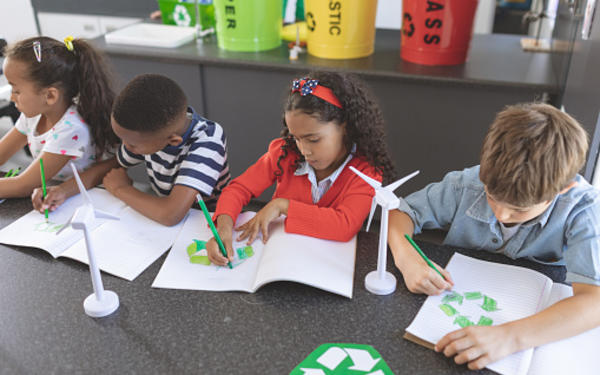Supporting recycling week 2021
Our commitment to champion sustainability and reduce our impact on the planet includes reducing, refusing, reusing and recycling our waste.

This week we’re supporting a recycling awareness week in the UK which is encouraging people to recycle more of the right things, more often, an initiative organised by global NGO Wrap. As a signatory of the UN Global Compact, Cambridge University Press & Assessment has made a commitment to champion sustainability and reduce our impact on the planet. This includes reducing, refusing, reusing and recycling our waste.
Our communities
Some of our Cambridge learners and teachers have been sharing the recycling initiatives they are involved in. “One of the most important places we should discuss sustainability is at school as there are different people of all ages with different opinions being able to talk about these issues together,” said a student from Aubrick school in Brazil. “We’ve learnt about recycling and reducing garbage. We’ve had a lot of conversations in science classes and our school has introduced separate bins for different types of trash which I think is very important.”
Lara, a teacher at Aubrick, said: “Since Kindergarten students participate in projects that aim to promote sustainable practise such as waste sorting, the use of compost bins and the reduction of waste. To encourage the reuse of materials, children are invited to play games with objects that would have been thrown away such as phones and food packaging. We believe that small acts can have a big impact on the environment.”
“Schools have an important role to play in teaching new ways of contributing to the environment as well as inspiring our children to make a difference that truly impacts our planet and our community,” said Cyntia, a teacher at Aubrick.
To support learners, our English Language Teaching team have prepared interactive activities paired with relevant environmental vocabulary for use in the classroom – such as ‘upcycling’ our Cambridge Dictionary Word of the Year for 2019. Our Education team discuss seven quick and easy ways to reduce classroom waste such as losing the laminator, printing on both sides of paper, making puzzles and games from used cardboard and using reusable plates and cups for classroom parties.
Our commitment
Across our own operations, we are working towards plastic free distribution. We aim for plastic free journal distribution by the end of 2022 and have switched 40 per cent of our annual journal print from polywrap to FSC approved paper wrapping since October 2020. We are also systematically removing non-recyclables such as CDs and DVDs from our products.
Our Cambridge Africa team has launched a waste reduction and recycling programme this year. “Cambridge Africa is working to build a business that allows its people and the environment to thrive. Climate change is already a reality here and extreme weather events like droughts are a part of our lives, but it’s great to be a part of an organisation that cares about the planet and is taking steps to reduce our impact,” said Pinky Magadla from our office in Cape Town.
In Manila, Philippines, a group of colleagues called ‘Eco-Warriors’ proactively champion environmental responsibility with our customers and are working with waste contractors to work towards zero waste to landfill. Our office in Madrid, Spain, is now ‘plastic free’ as our colleagues all switching to reusable bottles and containers. While in our UK offices, we have been exploring ways to optimise recycling from office waste, such as introducing a recycling scheme for crisp packets, a popular snack.
These initiatives and adjustments to our approach to waste help us towards one of our sustainability goals which is sending nothing to landfill.
Find out more about our environment commitment and follow #CambridgeSustainability on Twitter for all the latest news and updates.
